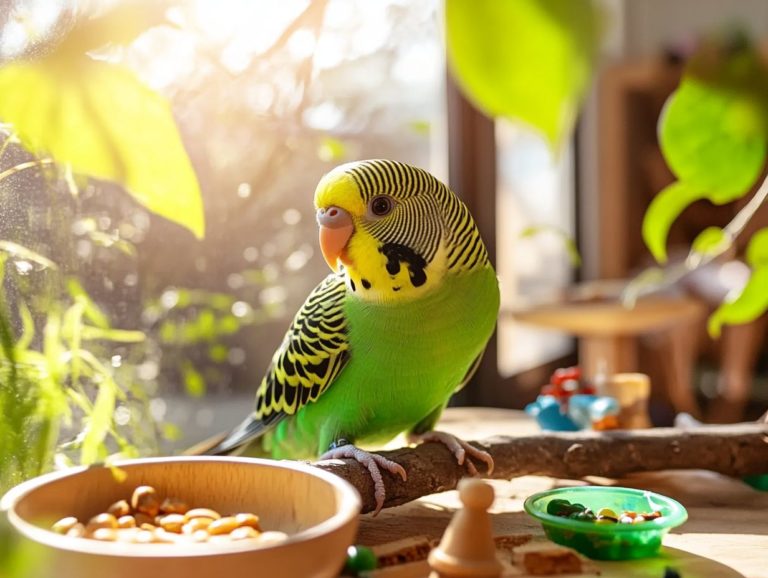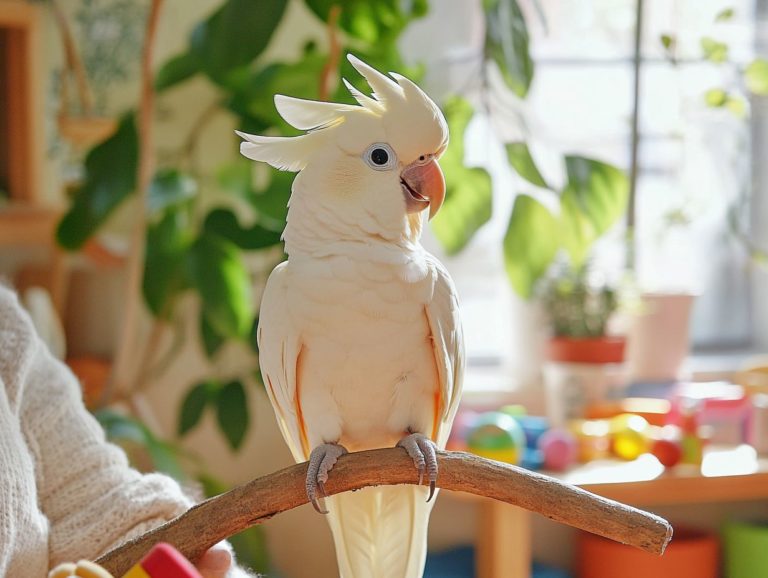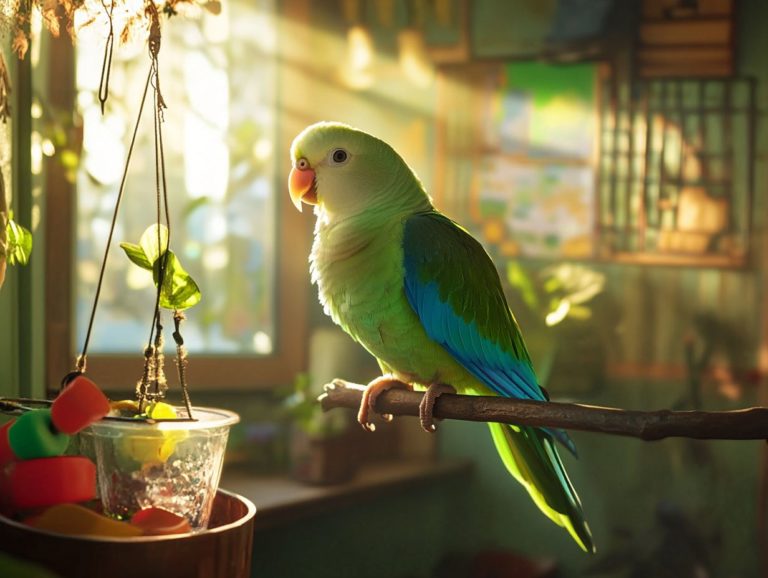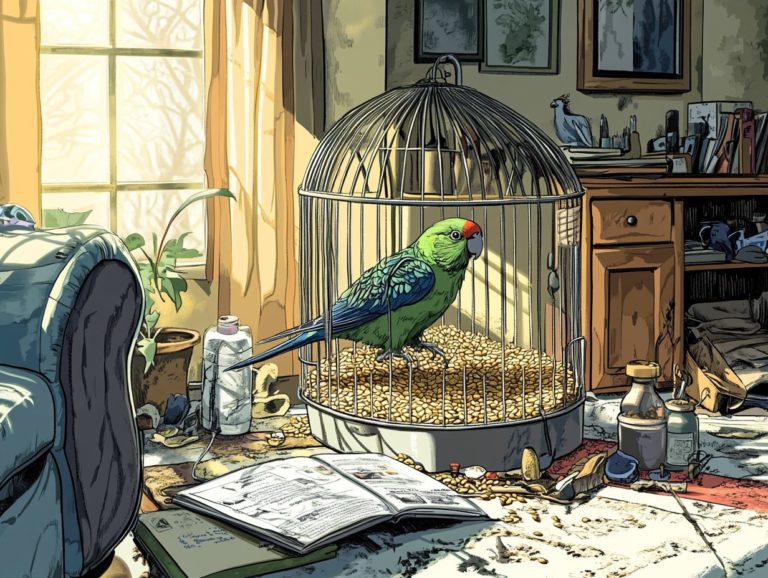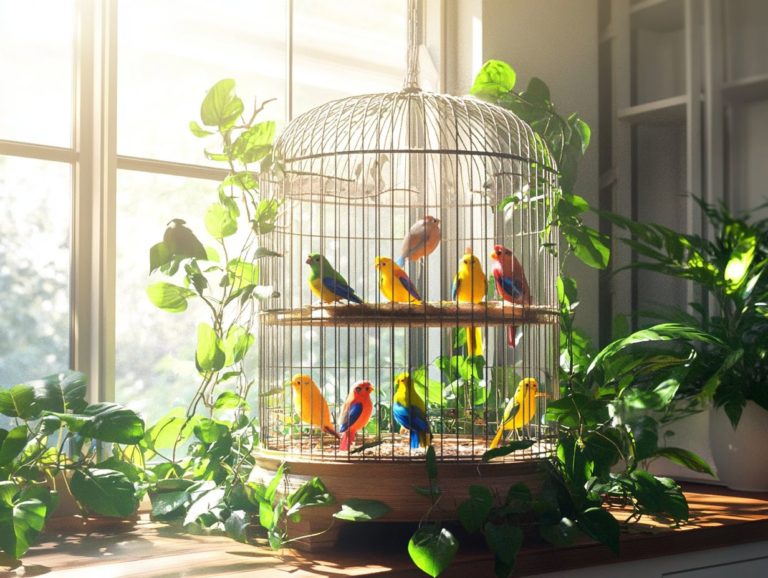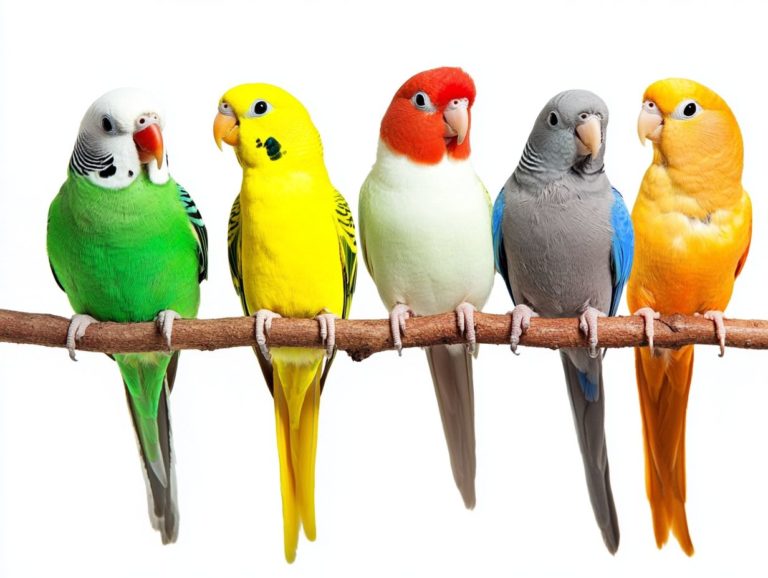Essential Care for Aging Cockatoos
Aging is an inevitable part of life. When it comes to cockatoos, it introduces distinct challenges and changes that demand your careful attention. As these magnificent birds mature, their physical, nutritional, and emotional needs shift. It s essential for you to adapt your caregiving approach.
Get ready to explore common changes associated with aging cockatoos! This article covers everything from diet and exercise to mental stimulation and health considerations. It will guide you on creating a nurturing environment that promotes your senior cockatoo’s well-being.
Dive in to discover vital care tips that will help ensure your feathered companion flourishes during their golden years!
Contents
Key Takeaways:
- Proper diet and exercise are critical for aging cockatoos to maintain physical health and mental well-being. Regular vet check-ups can help identify and address any potential health concerns.
- Aging cockatoos require mental stimulation through enrichment activities and toys to prevent boredom and promote cognitive function. This can include puzzles, foraging toys, and social interaction with their caregivers.
- Creating a comfortable living space is essential for senior cockatoos. This includes providing soft perches, easy access to food and water, and adapting the living space to accommodate any physical limitations they may have.
Understanding Aging in Cockatoos
Understanding aging in cockatoos is essential for ensuring their long-term health and happiness. Various species, like the Sulfur-crested cockatoo, Galah cockatoo, and Moluccan cockatoo, can thrive for decades in environments such as aviaries across Australia and Southeast Asia. Knowledge becomes your ally.
Being aware of the common changes and challenges that come with aging allows you to provide the right care for your feathered companions. Additionally, understanding macaw maintenance enables you to monitor their behavior closely and seek timely veterinary advice when needed, all contributing to a vibrant and healthy life for your beloved cockatoos.
Common Changes and Challenges
As cockatoos age, you may notice several common changes that can pose challenges for you as their caregiver. These changes might include alterations in the sounds they make, behavior, and physical health, potentially leading to issues like feather plucking.
One of the first signs of aging you might observe is a noticeable decline in their energy levels. This results in less engagement in social interactions and playtime. You may also find their vocalizations shifting; quieter chirps or a reduced frequency of calls could indicate discomfort or distress rather than just a change in personality.
Aging cockatoos may also face health complications such as arthritis or respiratory issues, complicating their quality of life. All these factors underscore the necessity for attentive caregiving. Ensure they receive regular veterinary check-ups and a supportive environment, allowing them to navigate their golden years with the dignity they deserve.
Physical and Nutritional Needs of Aging Cockatoos
The physical and nutritional needs of aging cockatoos are crucial for their overall health and well-being. You should provide them with a balanced diet, enriched with essential nutrients such as vitamin drops. For more information, consider exploring the nutritional needs of aging birds. This helps combat age-related health issues, ensuring your cockatoos lead vibrant and active lives.
Importance of Proper Diet and Exercise
A proper diet and regular exercise are essential for maintaining the health of aging cockatoos. To ensure their well-being, it’s important to know how to care for an older bird. They need to stay active and engaged, which can significantly enhance their quality of life as they face the challenges of aging.
Incorporating a wide variety of fresh fruits, vegetables, and high-quality pellets into their meals provides the necessary vitamins and minerals crucial for their well-being. Foods like leafy greens, carrots, and berries not only support their immune system but also enhance their plumage and overall vitality.
Physical activity is vital in preventing obesity, a common issue among older birds. It also offers the mental stimulation they need to combat feelings of boredom or depression. Simple activities like foraging, playing with toys, or even supervised flight can greatly contribute to their physical and mental health, ensuring they enjoy a fulfilling and enriched life.
Act now to give your cockatoo the best care possible! Implement these tips and consult with your vet for personalized advice to keep your feathered friend thriving.
Providing Mental Stimulation for Aging Cockatoos
Ensuring mental stimulation for aging cockatoos is crucial to keeping their minds sharp and preventing behavioral issues.
Boredom can lead to destructive behaviors or excessive vocalization. Incorporating engaging toys and enrichment activities is essential in their care routine.
Enrichment Activities and Toys
Enrichment activities and toys are vital for keeping your aging cockatoos mentally stimulated and engaged. This helps prevent issues like feather plucking and promotes a healthy and active lifestyle.
When selecting toys, opt for those made from materials that are safe for them to chew on, such as untreated wood, natural fibers, and BPA-free plastics. Activities like puzzle feeders will challenge their problem-solving abilities while mimicking their natural foraging behavior, which is vital for their mental health.
Engage in interactive playtime with your cockatoos to strengthen your emotional bonds and foster a deeper sense of security. Incorporate gentle training exercises to stimulate their minds and give them a sense of achievement while encouraging physical activity. A thoughtfully curated environment will significantly enhance their thinking skills and emotional well-being.
Common Health Concerns for Aging Cockatoos
Aging cockatoos can face various health issues, and as a caregiver, it’s important to keep a close eye on their well-being. Don’t hesitate to reach out to your vet if you see anything unusual, such as feather plucking or changes in appetite and energy levels. Understanding the effects of aging on pet birds can also help you provide better care.
Your attentiveness can make all the difference in ensuring a happy and healthy life for your feathered companion.
Signs to Watch for and How to Address Them
Recognizing the signs of health issues in aging cockatoos is essential for timely intervention. Look out for indicators like feather plucking, changes in vocalization, or a decrease in appetite get veterinary advice right away!
Other warning signs include lethargy, increased aggression, or difficulty in perching. These can signal underlying health problems. Monitor your feathered companion’s droppings; any changes in color, consistency, or odor can be telling.
By keeping a close eye on these behavioral and physical changes, you can detect potential issues early on and prevent them from worsening without prompt action. If multiple concerns arise simultaneously or if your bird shows signs of distress, consult an exotic veterinarian preferably one who specializes in avian health, which refers to the health of birds. This ensures that necessary treatments or adjustments to their care routine are addressed swiftly and effectively.
Creating a Comfortable Environment for Aging Cockatoos
Creating a nurturing and safe habitat for aging cockatoos is essential to their well-being. Ensure their housing, whether in an aviary or a home setting, is spacious and safe, equipped with the right features to accommodate their evolving needs as they grow older.
Adapting the Living Space for Senior Birds
Adapting your living space for senior cockatoos requires thoughtful changes to ensure their safety and comfort. Lowering perches and providing softer surfaces will enhance their overall well-being while accommodating their changing physical needs as they age.
For example, adding ramps can significantly improve mobility for those dealing with arthritis or other joint issues. Removing sharp objects from their environment helps prevent accidental injuries. Placing food and water bowls at a lower height allows these birds to feed themselves more easily, fostering their independence. Ensure adequate lighting to assist their vision, enabling them to navigate their surroundings with greater confidence.
All these modifications work together to create a nurturing and safe habitat for elderly cockatoos.
Frequently Asked Questions
What is essential care for aging cockatoos?
Essential care for aging cockatoos involves providing the necessary support and attention to ensure their physical and mental well-being, as highlighted in the top 7 tips for cockatoo care, as they age.
For more questions or additional information, feel free to reach out!
What are the signs of aging in cockatoos?
Look for changes in feather color and texture. You might also notice decreased activity, loss of appetite, and mobility issues.
What should I feed my aging cockatoo?
As cockatoos age, their diet needs change. Offer a balanced mix of fresh fruits, vegetables, and high-quality pellets.
How can I keep my aging cockatoo mentally stimulated?
Provide fun toys that encourage activity. Rotate them regularly and engage your cockatoo in training activities.
Should I take my aging cockatoo to the vet for regular check-ups?
Yes, regular visits to an avian vet are crucial. They help monitor your cockatoo’s health and catch any issues early.
What are some common health concerns for aging cockatoos?
Common issues include arthritis, respiratory problems, and hormonal imbalances. Stay informed and seek medical care when necessary to keep your cockatoo healthy.

